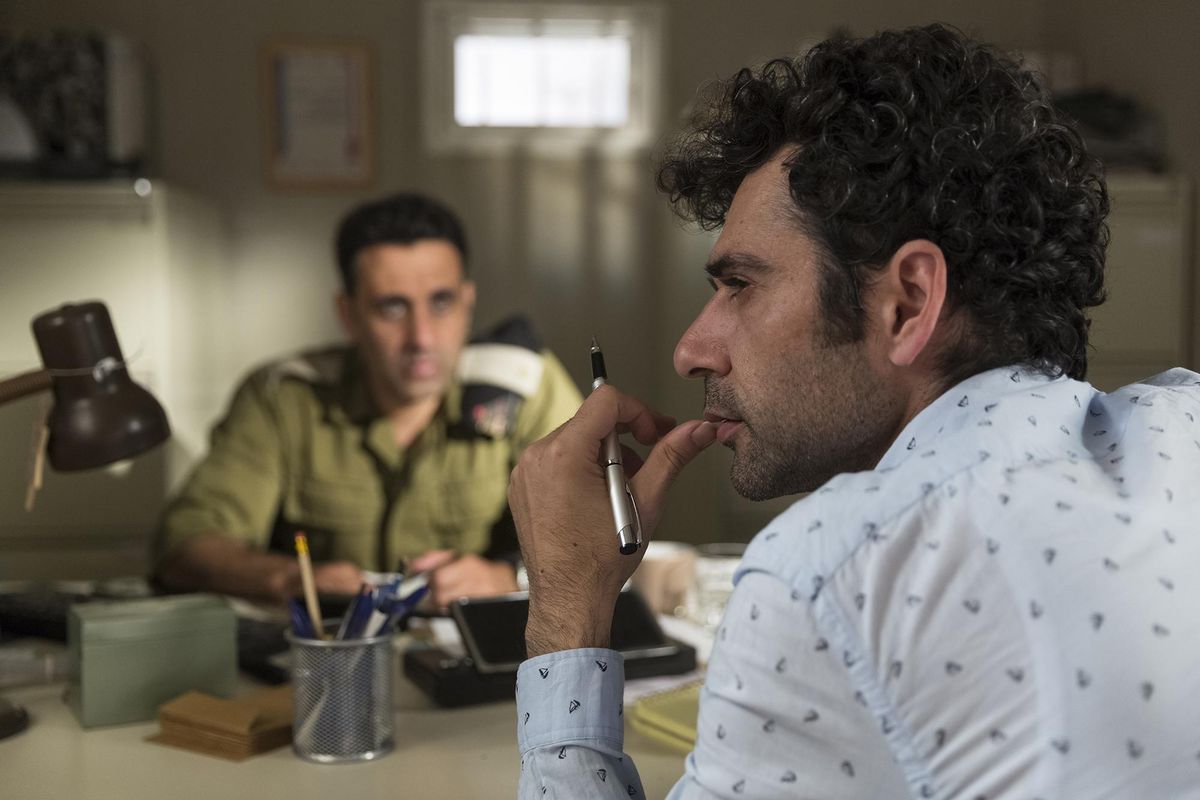‘Tel Aviv on Fire’ review: A movie about the Israeli-Palestinian conflict that’s lighthearted and entertaining? Yes

Lighthearted and entertaining aren’t words often used to describe movies about the Israeli-Palestinian conflict. But the characterization fits “Tel Aviv on Fire” to a T.
Sameh Zoabi’s satire tells the story of a contemporary Palestinian TV crew in Ramallah filming a series titled “Tel Aviv on Fire” set in Jerusalem in 1967 during the lead-up to the Six-Day War. A Palestinian citizen of Israel, Zoabi previously co-wrote, with Hany Abu-Assad, the 2015 drama “The Idol.”
In the titular show-within-a-show, a Palestinian woman (Lubna Azabal of “Incendies”) adopts a fake Jewish identity to win the affections of an Israeli army officer named Yehuda and thereby infiltrate Israel’s military.
Despite its pro-Palestinian slant, the TV melodrama becomes popular with Palestinians and Israelis – particularly female viewers who find the story romantic.
Salam (Kais Nashif, who co-starred with Azabal in “Paradise Now”) is an affable 30-something Palestinian. Despite having seemingly no qualifications to work in television, he is hired by his uncle Bassam (Nadim Sawalha) – who happens to be the series’ heavyweight producer – to help authenticate the show’s dialogue thanks to his excellent Hebrew.
When a colleague quits, Salam is suddenly promoted from production assistant to one of two writers on the show, with responsibility for Yehuda’s lines. Salam’s newfound prominence catches the interest of an old flame, Mariam (Maisa Abd Elhadi, recently seen in “The Reports on Sarah and Saleem”).
But his twice-daily commute through a West Bank checkpoint also draws the attention of Assi (Yaniv Biton), an Israeli military officer whose wife loves the show. Assi quibbles with its portrayal of Yehuda, telling Salam, “You know nothing about the army.”
In short order, the inexperienced Salam becomes a daily visitor to Assi’s command post, plying him with Palestinian-made hummus (Assi’s weakness) in return for advice on how to flesh out the character of Yehuda.
The only snag: Assi also wants to steer the show’s plot toward an improbable Israeli-Palestinian rapprochement, while Salam’s colleagues – not to mention the show’s financial backers – envision a more insurrectionary ending.
The film humorously skewers the practice of national mythmaking, raising the question of where the line falls between art and propaganda, when one person’s terrorist is another’s freedom fighter.
It also follows in the great tradition of movies about moviemaking, affirming the power of the screen to bring together people of different beliefs and backgrounds, to kindle romance and even to help an aimless young man find his calling.
At the same time, “Tel Aviv on Fire” the TV show and the movie indulge in the sweeping melodrama of Middle Eastern soaps, with sensational plot twists and cheesy love scenes.
At certain points, this approach feels too slight, with characters in the movie seeming barely more developed than those on the TV show. Neither Salam’s broader motivations in life nor Mariam’s interest in him are explored with particular depth.
The filmmakers also could be accused of glossing over the region’s harsh geopolitical realities. Assi, for example, wields his power arbitrarily – and in ways that briefly turn dark. Yet he remains a generally sympathetic character, if also slightly buffoonish.
Notwithstanding occasional references to historical events (such as the first intifada and the Oslo accords, which Bassam describes as a “big illusion that changes nothing”), the film wears its politics quite lightly.
In offering a comedic take on not just the hostility between Israelis and Palestinians, but also the shared history and culture that bind them, “Tel Aviv on Fire” is an enjoyable respite from the bleakness that is far more typical of their stories.